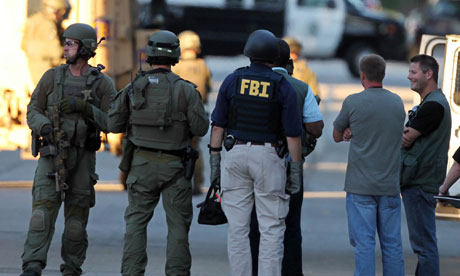Police and FBI comb gunman's house in Cudahy, as speculation grows over shooter's alleged links to white power groups

Experts spent Monday searching the
gunman's home in Cudahy, just a few miles from the gurdwara in Oak
Creek.
A gunman who killed six people at a Sikh place of worship in Wisconsin has been identified as a 40-year-old former soldier with alleged links to racist groups.
The white, heavy-set shooter – who some witnesses suggested carried tattoos marking the 9/11 terrorist attacks – was named as Wade Michael Page, an former serviceman once stationed at Fort Bragg in North Carolina. Officials have yet to confirm the killer's identity.
Meanwhile, the Southern Poverty Law Center – an organisation that monitors the activity of extremist groups – claimed on its website that the shooter was a "frustrated neo-Nazi who had been the leader of a racist white-power band".
Forensic experts spent Monday searching the gunman's home in Cudahy, just a few miles from Oak Creek, where the Sikh gurdwara is located.
More details about the gunman – and a possible motive – are expected to emerge at a police press conference scheduled for later on Monday.
Oak Creek police chief John Edwards has already confirmed that the suspect had a military background. It is thought Page was dismissed from the US army in 1998 for "patterns of misconduct", including being drunk on duty.
Edwards told CNN that the gunman "lived in a community neighbouring ours", and said authorities were "doing a 24-hour back-check, just to get any idea what he was up to, what he was doing".
"Right now there is no indication that there were any red flags," he said.
Sunday's attack is being investigated as an act of "domestic terrorism", police have said.
The suspect began shooting shortly before 10.30am local time as dozens gathered at the gurdwara. After killing people inside the building, the gunman fought with officers outside, critically injuring one. But a second officer was able to "put down" the suspect, police said. The killer was pronounced dead at the scene.
The wounded officer – who was shot multiple times – was rushed to hospital for emergency surgery. It is believed that he will survive.
Emergency response teams found the bodies of four victims inside the gurdwara. Three more bodies lay outside the building, including that of the suspect. Three others – including the policeman – were injured and taken to a nearby hospital. All were said to be in a "critical condition".
At a press conference on Sunday, Oak Creek police chief John Edwards said the "heroic actions" of the two officers "stopped this from being worse than it could have been".
Authorities said the gunman had used a 9mm semi-automatic pistol. The weapon, recovered at the scene, is thought to have been obtained legally, but police are still trying to track its origin.
Among those shot in the attack were prominent members of the local Sikh community. Jatin Der Mangat, 38, of Racine, said his uncle Satwant Singh Kaleka was one of those wounded, but he didn't know how serious his injuries were.
"It was like the heart just sat down," he said. "This shouldn't happen anywhere."
Sukhwindar Nagr, also of Racine, said he called his brother-in-law's phone. A granthi at the temple answered and told him that his brother-in-law had been shot, along with three granthi.
It is thought that around 50 people were in the gurdwara at the time of the attack.
The identification of the gunman has increased concerns that the attacker had a racist motive. The SPLC reported that Page was a known member of the white power music scene, and some witnesses said the suspect had a tattoo marking September 11. Some Sikhs had been targeted after 9/11, apparently mistaken for Muslims by people carrying out revenge attacks.
Authorities confirmed the dead suspect had tattoos, but said they were not sure exactly what they illustrated.
Police said it was too early to suggest a motive. But some Sikh members of the community told media that they feared that it was a hate crime. Others, however, have cautioned against jumping to conclusions.
Sapreet Kaur, executive director of the Sikh Coalition, the largest Sikh American civil rights organisation in the US, said: "There have been multiple hate crime shootings within the Sikh community in recent years and the natural impulse of our community is to unfortunately assume the same in this case."
"Let's let law enforcement investigate the case and as new facts emerge the dialogue can change."
The shooting came just 16 days after 12 people were killed and nearly 60 injured in a mass shooting at a movie theater in Aurora, Colorado, during a midnight screening of The Dark Knight Rises.
Wisconsin, like Colorado, has some of the most permissive gun laws in the country. Last year it passed a law allowing citizens to carry a concealed weapon.
The second mass shooting in two weeks will likely intensify pressure on US lawmakers to address the issue gun controls. President Barack Obama and Mitt Romney have been largely silent on guns.
However, in a statement delivered after Sunday's shooting, Obama said he was "deeply saddened" by the incident.
Words of condolences also came from leaders overseas, with Indian prime minister Manmohan Singh, a Sikh, expressing his shock and sadness.
Singh said: "That this senseless act of violence should be targeted at a place of religious worship is particularly painful."
No comments:
Post a Comment